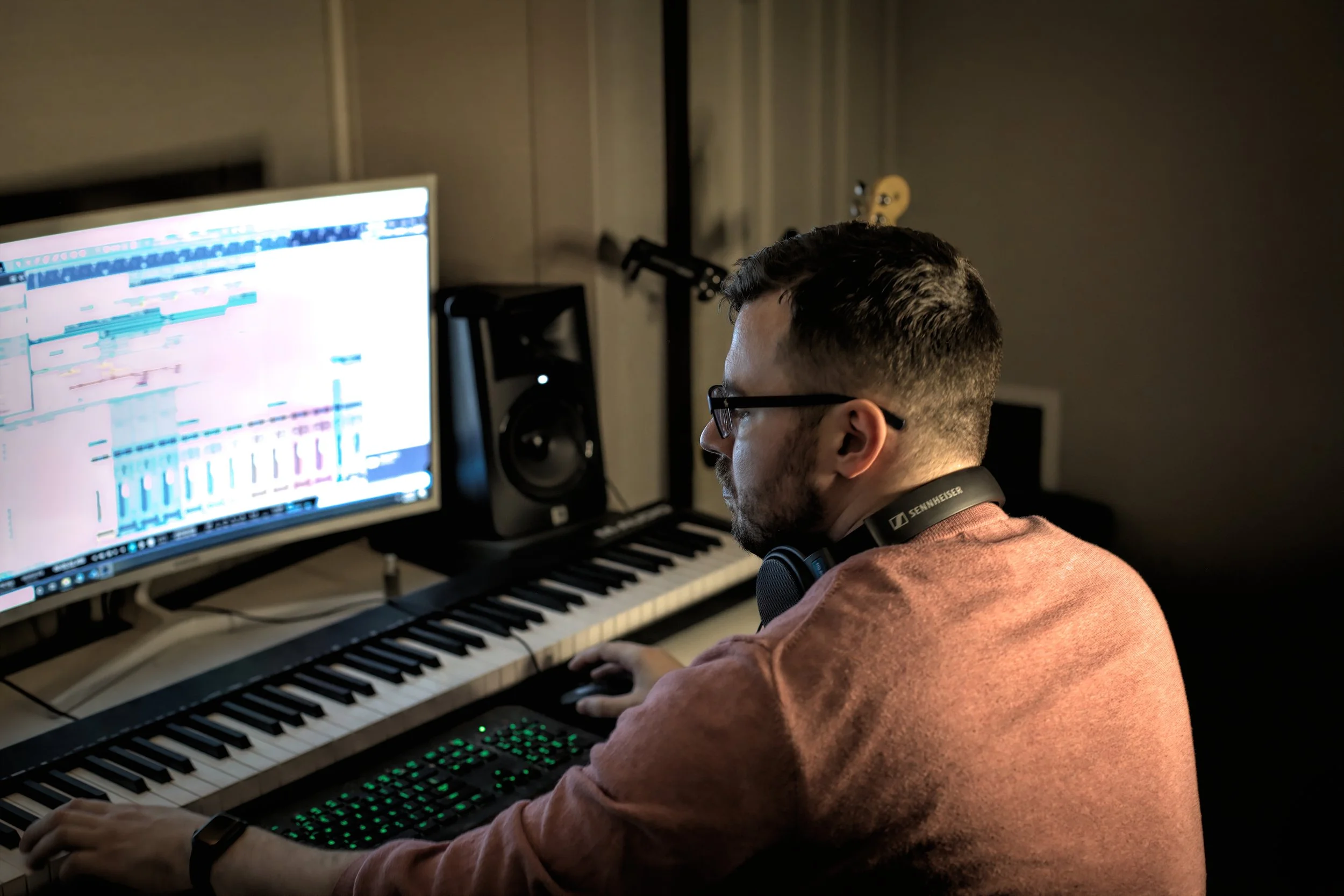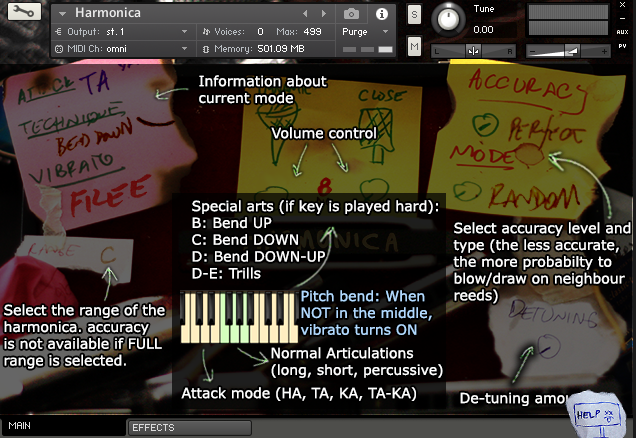Today I’ll be reviewing another product in Native Instruments’ fairly new orchestral product line, Symphony Series Woodwinds. I was in need of a wide ranging collection of solo woodwind instruments as well as ensembles, and the entire Symphony Series line has a very attractive price point, especially for owners of Komplete or Komplete Ultimate! I paid around $150 USD during a promotion where everything was 50% off, normally you’d pay $499 for the whole collection, and Komplete owners are eligible for a crossgrade price of $299 for everything, which is a really great price compared to the other collections on the market. They also offer this Woodwind library (and all NI Symphony Series products) in a stripped down, Symphony Essentials version, which is even cheaper, but lacking in the amount of features and articulations.
The full ensemble patch features color coded keys for each instrument section
GUI and Features
The GUI is consistent across the board with every Symphony Series library, and I really do appreciate the simplicity and layout. There are single patches for each articulation, which include “Effects” (some really nice flourishes, arps, and valve clicks), “Expression” (crescendos and decrescendos, sforzando, and swells), as well as the standard Sustain, Staccato, and Legato, and an additional Multi-articulation patch which enables keyswitches for switching articulations. There are options for enabling different arpeggios for the sustains, shorts, and legato patches, which is a nice option to have, although while some scales perform great, others are out of sync and really not very usable in my honest opinion. For instance: hold down the D key for a major arpeggio run, and it performs the arp in tight 16th notes. However, when you move up to the E key, it no longer performs the arp with consistent 16th notes, instead having more of a swing, which gives it a human feel, but it will not be in sync with any other 16th notes in your track, and the lack of consistency is quite frustrating. There is a “tightness” slider which I believe is meant to fix this issue, but it begins to make everything sound very synth-y and fake. This collection is also lacking an English Horn or Bass Clarinet, and strangely includes an ensemble of saxophones where the other instruments mentioned would be much more appropriate for an orchestral setting.
The Sound
The sound featured in this collection is truly a mixed bag, but it leans towards the negative end of the spectrum. I’ll be completely honest, my initial reaction upon loading up a few different instruments in both the ensemble and solo libraries, I was disappointed. There seems to be some sort of processing going on in the sounds, and there is a lot of ambient room noise and reverb included in the recordings, even with the “reverb” setting turned off. For the most part, the various effects like clusters, flourishes, and the like, all sound very natural and add a nice human performance to a composition, and I can definitely see myself using them quite a bit. However, this library is very hard to blend with other orchestral or woodwind libraries, due to the overall quality and nature of the recordings themselves. There seems to be an overall lack of purity, which I get from other libraries such as Spitfire Symphonic Woodwinds and 8dio’s Claire woodwind collection, both of which feature far superior sampling quality than NI’s offering. Some of the short patches are good, but the sustains sound very, very fake and processed to me. The legato also says it’s “true legato” but, the transitions are quite poor. I find these observations ring true with both the ensemble and solo libraries. Simply comparing the quality of the solo clarinet in Symphony Series to the 8Dio or Spitfire solo clarinet is truly night and day. There is an airy, raspy quality to the NI collection which just sounds bad to me. While this may serve the Bass Wind’s patch well, for others it sounds very out of place and just amateur overall, especially with the clarinets and bassoons. I have experimented extensively with different mic positions as well, and while I do prefer the close mic, I still do not like the overall sound of this library. The sounds are pleasant in low dynamics, but lacking in volume, as if played very far away. When you begin to push the dynamic slider up further, the warm, subtle pleasantness of the instrument quickly vanishes and is replaced by a harsh, raspy, buzzy tone quality, and everything sounds processed as if compressed. There is simply an uneven and inconsistent quality when it comes to the sounds you get with this collection, and it really is frustrating. While these instruments may work very well in a full orchestral setting, when played on their own in an exposed setting, they do not sound convincing to me. While it might be nice to use the flourishes and clusters and some effects in certain places, do not expect them to really blend well with other woodwind libraries, simply due to the difference in sound and timbre, which means I may never get any use out of it at all due to owning much better libraries for woodwinds. I don’t mean to imply this collection is useless for everyone, and it would work if you are a composer on a budget and aren’t looking for realistic and expressive performances. The effects included are really nice, and this product would suffice if you don’t use woodwinds often and need them to enhance a pop song, or use them in context with a full orchestra (if they play in an exposed setting they can’t really hold their own), but to me overall, there is a certain lack of quality that prevents this collection from earning a recommendation.
The Verdict -
5.5/10
Unfortunately, this collection falls far short of the quality standards expected from modern orchestral sample libraries. While it does offer a very good price and lots of content, I feel the samples themselves are of very poor quality, sounding overly processed and they never once were truly convincing. There is also the issue of having so much room ambiance and reverb baked into the samples themselves, which does not enhance this collection in any way. Sadly I feel this product was a waste of money, and while I only paid $150, please be warned for those looking for a “bread and butter” woodwind collection, it would be wise to invest in a library of higher quality from a more reputable company.














